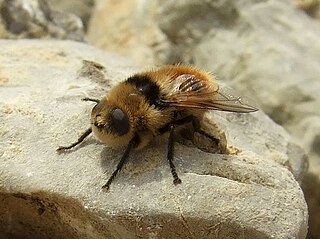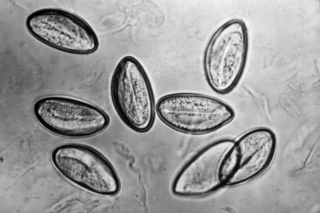
The chicken or the egg causality dilemma is commonly stated as the question, "which came first: the chicken or the egg?" The dilemma stems from the observation that all chickens hatch from eggs and all chicken eggs are laid by chickens. "Chicken-and-egg" is a metaphoric adjective describing situations where it is not clear which of two events should be considered the cause and which should be considered the effect, to express a scenario of infinite regress, or to express the difficulty of sequencing actions where each seems to depend on others being done first. Plutarch posed the question as a philosophical matter in his essay "The Symposiacs", written in the 1st century CE.

Meringue is a type of dessert or candy, often associated with Swiss, French, Polish and Italian cuisines, traditionally made from whipped egg whites and sugar, and occasionally an acidic ingredient such as lemon, vinegar, or cream of tartar. A binding agent such as salt, flour, or gelatin may also be added to the eggs. The key to the formation of a good meringue is the formation of stiff peaks by denaturing the protein ovalbumin via mechanical shear. Meringues are often flavoured with vanilla, a small amount of apple juice, or orange juice, although if extracts of these are used and are based on an oil infusion, an excess of fat from the oil may inhibit the egg whites from forming a foam.

The female reproductive system is made up of the internal and external sex organs that function in reproduction of new offspring. In humans, the female reproductive system is immature at birth and develops to maturity at puberty to be able to produce gametes, and to carry a foetus to full term. The internal sex organs are the uterus, Fallopian tubes, and ovaries. The uterus or womb accommodates the embryo which develops into the foetus. The uterus also produces vaginal and uterine secretions which help the transit of sperm to the Fallopian tubes. The ovaries produce the ova. The external sex organs are also known as the genitals and these are the organs of the vulva including the labia, clitoris, and vaginal opening. The vagina is connected to the uterus at the cervix.

Botflies, also known as warble flies, heel flies, and gadflies, are a family of flies technically known as the Oestridae. Their larvae are internal parasites of mammals, some species growing in the host's flesh and others within the gut. Dermatobia hominis is the only species of botfly known to parasitize humans routinely, though other species of flies cause myiasis in humans.

Eggnog, egg nog or egg-nog, historically also known as milk punch or egg milk punch, is a rich, chilled, sweetened, dairy-based beverage. It is traditionally made with milk, cream, sugar, whipped egg whites, and egg yolks. In some contexts, distilled spirits such as brandy, rum, whisky or bourbon are added to the drink.

Salmonellosis is a symptomatic infection caused by bacteria of the Salmonella type. The most common symptoms are diarrhea, fever, abdominal cramps, and vomiting. Symptoms typically occur between 12 hours and 36 hours after exposure, and last from two to seven days. Occasionally more significant disease can result in dehydration. The old, young, and others with a weakened immune system are more likely to develop severe disease. Specific types of Salmonella can result in typhoid fever or paratyphoid fever.

Parasitic worms, also known as helminths, are large macroparasites; adults can generally be seen with the naked eye. Many are intestinal worms that are soil-transmitted and infect the gastrointestinal tract. Other parasitic worms such as schistosomes reside in blood vessels.
Dogs, as with all mammals, have natural odors. Natural dog odor can be unpleasant to dog owners especially when dogs are kept inside the home, as some people are not used to being exposed to the natural odor of a non-human species living in proximity to them. Dogs may also develop unnatural odors as a result of skin disease or other disorders or may become contaminated with odors from other sources in their environment.
Pseudomonas taetrolens is a Gram-negative, nonsporulating, motile, rod-shaped bacterium that causes mustiness in eggs. Based on 16S rRNA analysis, P. taetrolens has been placed in the P. chlororaphis group.
Pseudomonas mucidolens is a Gram-negative, non-sporulating, motile, rod bacterium that causes mustiness in eggs. Based on 16S rRNA analysis, P. mucidolens has been placed in the P. fluorescens group.

Musty Musketeers is a 1954 short subject directed by Jules White starring American slapstick comedy team The Three Stooges. It is the 154th entry in the series released by Columbia Pictures starring the comedians, who released 190 shorts for the studio between 1934 and 1959.

Eggs are laid by female animals of many different species, including birds, reptiles, amphibians, a few mammals, and fish, and many of these have been eaten by humans for thousands of years. Bird and reptile eggs consist of a protective eggshell, albumen, and vitellus, contained within various thin membranes. The most commonly consumed eggs are chicken eggs. Other poultry eggs including those of duck and quail also are eaten. Fish eggs are called roe and caviar.

2-Methylisoborneol (MIB) is an irregular monoterpene derived from the universal monoterpene precursor geranyl pyrophosphate. MIB and the irregular sesquiterpene geosmin together account for the majority of biologically-caused taste and odor outbreaks worldwide. MIB has a distinct earthy or musty odor, which most people can easily smell. The odor detection threshold of MIB is very low, ranging from 0.002 to 0.02 micrograms per liter in water. MIB is also a factor in cork taint in winemaking.

Pinworm infection, also known as enterobiasis, is a human parasitic disease caused by the pinworm. The most common symptom is itching in the anal area. This can make sleeping difficult. The period of time from swallowing eggs to the appearance of new eggs around the anus is 4 to 8 weeks. Some people who are infected do not have symptoms.

Musty Rusty is an album by jazz saxophonist Lou Donaldson recorded for the Cadet label in 1965 and performed by Donaldson with Bill Hardman, Billy Gardner, Grant Green, and Ben Dixon.

2,4,6-Tribromoanisole (TBA) is a chemical compound that is a brominated derivative of anisole. It is one of the chemicals responsible for cork taint.
2,4,6-Tribromophenol (TBP) is a brominated derivative of phenol. It is used as a fungicide, as a wood preservative, and an intermediate in the preparation of flame retardants.

Harry B. Watson Jr. was an American actor and comedian. Before his Vaudeville, Broadway and film careers, he was a clown for Ringling Bros. and Barnum & Bailey Circus. Among his Broadway shows were the musical Tip-Toes and five editions of the Ziegfeld Follies.
The highest-profile of Watson's few feature films were with Marion Davies and silent film star Harrison Ford:Little Old New York and Zander the Great, two of his three Hearst Cosmopolitan Productions. But Watson is perhaps best recalled today as the star of a series of bizarre silent comedy shorts, The Mishaps of Musty Suffer. Two volumes of surviving Musty Suffer titles—many featuring Watson’s comedy partner, George Bickel—were restored by the American Library of Congress and released with music by Ben Model on DVD by Undercrank Productions in 2014 and 2015.

Avimaia is a genus of fossil birds of the Enantiornithes clade that lived about 115 million years ago in Northwest China. The only known species is A. schweitzerae. The holotype fossil of the bird was found in the Xiagou Formation, and is noted as the first discovered fossil bird with an unlaid egg. Abnormalities, including egg binding in which the egg becomes stuck within the body of the bird causing death, were found in the egg suggesting that the preserved egg may have caused this bird's demise. Egg binding is a serious and lethal condition that is fairly common in small birds undergoing stress.














